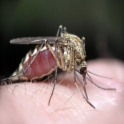West Nile Virus:
What Montgomery County Residents Need to Know
What Is West Nile Virus?

West Nile virus is a disease transmitted from infected birds to people by mosquitoes. Although most people who are infected only experience mild flu-like symptoms, a small number of infected individuals may develop life threatening complications such as encephalitis or meningitis (inflammation of the brain or brain lining). West Nile virus can be fatal in some cases.
West Nile virus was first identified in Uganda in 1937 and it first appeared in the United States in New York City in 1999 and it spread across the country. It is now considered endemic (constantly present) in our area and throughout the United States. To date there is no cure for West Nile virus.
How People Become Infected with West Nile Virus
There are three things that must happen to spread West Nile virus:
- There must be an infected bird.
- A mosquito must bite the bird and become infected.
- The infected mosquito must then transfer the virus by biting a person.
Health officials believe that people do not get West Nile virus directly from a bird, other animals or an infected person. The mosquito is necessary to spread the virus. That is why the best way to prevent West Nile virus is to get rid of mosquito breeding places. With fewer mosquitos, the transmission cycle is broken or greatly weakened.
What You Can Do to Reduce The Risk of Becoming Infected With West Nile Virus
- Eliminate standing water on your property--mosquitoes can lay eggs in as little as one teaspoon of standing water.
- Every week tip and toss water from containers such as flower pots, buckets and garbage can lids.
- Clean bird baths and change the water.
- Tip and toss standing water found in children's toys such as pools, toy cars and trucks, and wagons.
- Turn over and empty water that collects in tarps used to cover grills and wood piles.
- Be sure that drain pipes and downspouts from gutters are free of debris so they drain properly.
- Throw away used tires. If you have a tire swing, drill holes in the bottom of the tire so water will drain.
- Fix dripping outdoor faucets.
- Dispose of trash such as bottle caps, open drink cans or bottles, Styrofoam cups, foil or plastic food wrappers.
- Get rid of puddles from window air conditioners
- Help your neighbors find and eliminate standing water.
- For water you cannot totally eliminate, dump or flush out once a week. Remember to check flower pots on balconies and decks of apartment buildings too.
- Add first or aerator or larvicide (mosquito dunks) to ornamental ponds. Fish will eat mosquito eggs and larvae. An aerator will keep water moving. Water must be stagnant for adult mosquitoes to develop. Larvicide will prevent mosquito larva from developing. If you use mosquito dunks, check your pond regularly and replace dunks when necessary. Animals such as squirrels, raccoons and dogs like to eat mosquito dunks. This does not hurt the animal.
- Protect yourself and your family against mosquito bites
- Avoid mosquito infested areas.
- Limit outdoor activities at peak times of mosquito biting.
- Use fine-mesh screens on open windows and doors.
- Repair tears or large holes in these screens.
- Wear light-colored and loose-fitting clothing.
- Wear long-sleeved shirts and long pants.
- Use insect repellant when outdoors (follow directions on container). Spray clothes before putting them on.
For More Information
Download "West Nile Virus: What People in Montgomery County Need to Know" ( PDF)
Centers for Disease Control and Prevention
West Nile Virus Website
www.cdc.gov/westnile
Maryland Department of Health and Mental Hygiene
West Nile Virus Website
www.dhmh.maryland.gov
Montgomery County Department of Environmental Protection
Some Facts About Mosquitoes & Stormwater Management Facilities ( PDF)
